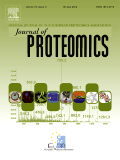
Journal of Proteomics
metrics 2024
Transforming research with cutting-edge proteomic insights.
Introduction
Journal of Proteomics, published by Elsevier, is an esteemed peer-reviewed journal dedicated to advancing research in the field of proteomics, with broad implications for biochemistry and biophysics. Established in 2008, the journal has continuously evolved, embracing innovative methodologies and technologies that facilitate protein analysis from a variety of biological systems. With its current standing in the Q2 category for both biochemistry and biophysics as of 2023, it is recognized as a significant contributor to scientific literature. The journal publishes original research articles, reviews, and methodological advancements, providing invaluable insights for researchers, professionals, and students alike. Although it does not offer open access, the journal remains a crucial platform for disseminating knowledge that informs various applications, ranging from drug development to disease understanding. As it converges towards 2024, the Journal of Proteomics continues to solidify its role in shaping the future of proteomic research through rigorous scientific inquiry and innovation.
Metrics 2024
 0.74
0.74 2.80
2.80 3.00
3.00 124
124Metrics History
Rank 2024
IF (Web Of Science)
JCI (Web Of Science)
Quartile History
Similar Journals

Proteomics Clinical Applications
Fostering Knowledge Exchange in Clinical ProteomicsProteomics Clinical Applications, published by Wiley-VCH Verlag GmbH, is a pivotal journal in the realm of Clinical Biochemistry, with an impressive track record since its inception in 2007, continuing its impactful contributions to 2024. With an ISSN of 1862-8346 and an E-ISSN of 1862-8354, this prestigious journal currently holds a commendable Q2 ranking in Clinical Biochemistry, situated at the 54th percentile among its peers within Scopus rankings. Dedicated to the advancement of proteomics and its applications in clinical settings, Proteomics Clinical Applications serves as a bastion for innovative research, fostering knowledge exchange among scientists, healthcare professionals, and students alike. Through its focus on novel methodologies and translational research, the journal aims to bridge the gap between laboratory findings and clinical practice, significantly impacting patient care and outcomes. Although not open access, its content is accessible through various academic databases, ensuring that vital research reaches its intended audience.

Clinical Proteomics
Transforming Biomedical Research Through ProteomicsClinical Proteomics is a leading open-access journal, published by BMC since 2011, that aims to advance the field of proteomics by providing a platform for the dissemination of original research, critical reviews, and technological advancements in the analysis of proteins and their roles in health and disease. With an ISSN of 1542-6416 and E-ISSN 1559-0275, this esteemed journal covers a broad scope, converging years of research from 2004 to 2024. As a distinguished publication, it holds a Q1 ranking in Clinical Biochemistry and Q2 in both Molecular Biology and Molecular Medicine, reflecting its significance in the scientific community. Clinical Proteomics' commitment to open access ensures that its content is readily available to researchers, professionals, and students worldwide, facilitating the exchange of knowledge and fostering collaborative efforts in proteomic studies. Situated in the United Kingdom, this journal plays a pivotal role in shaping the future of biomedical research, appealing to anyone keen on the integration of proteomics in clinical practice and molecular investigation.

BIOCHEMICAL AND BIOPHYSICAL RESEARCH COMMUNICATIONS
Fostering innovation in biochemical and biophysical research.BIOCHEMICAL AND BIOPHYSICAL RESEARCH COMMUNICATIONS, published by Academic Press Inc Elsevier Science, stands as a leading periodical in the fields of biochemistry, biophysics, cell biology, and molecular biology. With an ISSN of 0006-291X and an E-ISSN of 1090-2104, this esteemed journal has been a pivotal platform for the dissemination of groundbreaking research since its inception in 1959, continuing to publish influential findings through at least 2024. It holds a commendable Q2 ranking in Biochemistry and Q1 status in Biophysics as of 2023, reflecting its high impact and relevance in the field, supported by its strong Scopus rankings—ranking #43 in Biophysics and maintaining a presence in the top quartiles of several related categories. Although it is not an open-access journal, it provides critical insights and essential data that cater to researchers, professionals, and students keen on advancing their understanding of complex biochemical and biophysical processes. Its significant contributions to the scientific community underscore the importance of this journal as a reference point for innovative research and collaborative discourse.

GENOMICS PROTEOMICS & BIOINFORMATICS
Empowering research with open access to groundbreaking discoveries.GENOMICS PROTEOMICS & BIOINFORMATICS, published by Elsevier, stands at the forefront of cutting-edge research in the fields of genomics, proteomics, and bioinformatics. This esteemed journal, with an impact factor reflecting its significant influence, has embraced an Open Access model since its inception in 2003, ensuring that knowledge is freely accessible to a global community of researchers, professionals, and students. Based in China, it has been recognized for its exemplary contributions, achieving Q1 quartile rankings in major categories such as Biochemistry, Computational Mathematics, Genetics, and Molecular Biology as of 2023. Moreover, its commendable Scopus rankings position it among the top journals in its fields, with outstanding percentile performances that highlight its scholarly impact. As it continues to converge from 2003 to 2024, the journal aims to foster innovation and collaboration, making it an essential platform for disseminating vital insights and advancements in molecular life sciences.

Frontiers in Molecular Biosciences
Bridging Research and Impact in Health and DiseaseFrontiers in Molecular Biosciences is an esteemed open-access journal published by FRONTIERS MEDIA SA, based in Switzerland. Since its inception in 2014, the journal has made significant strides in the fields of biochemistry, genetics, and molecular biology, cementing its reputation with a solid position in the Q1 quartile for both Biochemistry and Genetics and Molecular Biology (miscellaneous) categories as of 2023. With a remarkable Scopus rank of #14/103 in the combined categories, it offers an essential platform for the dissemination of high-quality research that shapes the understanding of molecular processes and their implications in health and disease. The journal’s commitment to open access facilitates the broadest possible reach for groundbreaking discoveries, serving as a vital resource for researchers, professionals, and students alike. Located at AVENUE DU TRIBUNAL FEDERAL 34, LAUSANNE, this journal continues to foster innovative discussions and advancements in molecular biosciences, paving the way for new insights and collaborations in the scientific community.

Proteomes
Connecting Researchers in the Evolving Landscape of Proteomics.Proteomes, published by MDPI since 2013, is a notable open access journal that occupies a critical place in the realms of Biochemistry, Clinical Biochemistry, Molecular Biology, and Structural Biology. Based in Switzerland, this journal not only promotes the dissemination of high-quality research pertaining to protein structures and functions but also emphasizes interdisciplinary approaches that bridge various fields of biomedical science. With a Category Quartile ranking of Q2 across multiple pertinent categories in 2023, Proteomes boasts a competitive impact within the scientific community, evidenced by its robust Scopus rankings. Researchers, professionals, and students are invited to explore a wealth of pioneering studies and reviews that are made freely accessible, aligning with global trends in open scientific communication. Whether contributing original research or seeking to expand their knowledge, the journal serves as an invaluable resource for anyone engaged in the evolving landscape of proteomics.

Mass Spectrometry Letters
Empowering Researchers through Open Access Discoveries.Mass Spectrometry Letters is a pioneering open-access journal published by the Korean Society for Mass Spectrometry, specializing in the diverse fields of analytical chemistry, biochemistry, and spectroscopy. Established in 2010, this journal aims to disseminate groundbreaking research and advancements in mass spectrometry and its applications across various scientific domains. Though currently categorized in the Q4 quartile in key analytical fields, Mass Spectrometry Letters serves as an essential platform for researchers, professionals, and students to share innovative methodologies, emerging trends, and practical applications of mass spectrometry, thus fostering collaboration and advancing knowledge in the scientific community. With a commitment to open access, articles published since 2010 are readily available, enabling widespread distribution and engagement within the international research community. Located in Daejeon, South Korea, and actively converging research through 2024, the journal holds the potential to grow its impact and relevance within the dynamic landscape of mass spectrometry.

BIOCHEMISTRY-MOSCOW
Pioneering Insights in Biochemistry and BeyondBIOCHEMISTRY-MOSCOW is a distinguished academic journal published by MAIK NAUKA/INTERPERIODICA/SPRINGER, focusing on pivotal research in the fields of biochemistry, biophysics, geriatrics, and broader medical sciences. Established in 1972, the journal has a rich history of disseminating critical findings and innovative studies, making significant contributions to the advancement of biochemical knowledge and applications. With its Q2 ranking in various categories including biochemistry and gerontology, the journal commands respect within the scientific community, offering a reputable platform for both established researchers and emerging scholars alike. Although traditionally not an open-access journal, it provides a wealth of information accessible through institutional subscriptions, ensuring the latest advancements reach a global audience. The journal aims to enhance understanding of biochemical processes and their implications for human health, and its commitment to high-quality peer-reviewed content has established it as a vital resource for those invested in the life sciences.

PROTEIN SCIENCE
Elevating Knowledge in Protein Science and ApplicationsPROTEIN SCIENCE, published by Wiley, is a premier journal dedicated to the field of biochemistry, molecular biology, and medicine, boasting an impressive impact factor that reflects its influence and importance within the academic community. Established in 1992, the journal has continuously provided a platform for high-quality research, with a current classification in the top quartile (Q1) for its critical contributions to the understanding of protein structure and function, as well as its applications in health and disease. With a Scopus ranking placing it in the 91st percentile among its peers, PROTEIN SCIENCE publishes cutting-edge studies and reviews that are essential for researchers, professionals, and students seeking to advance their knowledge in protein research. Although it does not currently offer open access options, the journal remains dedicated to disseminating vital findings that support the ongoing advancements in molecular biology and biochemistry. Researchers can count on PROTEIN SCIENCE for consistently rigorous peer-reviewed content that fosters meaningful dialog and innovation in the life sciences.

JOURNAL OF PROTEOME RESEARCH
Unveiling the Secrets of Protein InteractionsJOURNAL OF PROTEOME RESEARCH is a premier publication in the field of proteomics, disseminating cutting-edge research and methodologies that drive advancements in biochemistry and molecular biology. Published by the American Chemical Society, this esteemed journal boasts a robust impact, as evidenced by its Q1 rankings in both Biochemistry and miscellaneous Chemistry categories for 2023. With a reputation bolstered by a solid Scopus ranking—#64 out of 408 in General Chemistry and #80 out of 438 in Biochemistry—the journal serves as an essential resource for researchers, professionals, and students aiming to deepen their understanding of protein functions and interactions in biological systems. Although it does not operate under an open-access model, the JOURNAL OF PROTEOME RESEARCH remains a critical platform for scholarly discourse, committed to publishing high-quality, peer-reviewed articles through 2024 and beyond. Scholars are encouraged to engage with the pioneering studies and reviews that shape the future of proteomics.